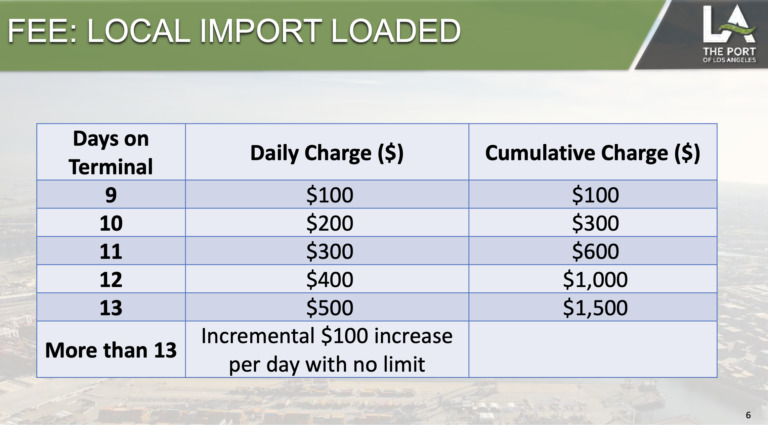Good news for ocean carriers: officials at the ports of Los Angeles and Long Beach have again moved the start date to collect on a fee attached to imports lingering at terminals past their allotted time.

The ports announced Nov. 18 that the tentative implementation date of the Container Dwell Fee is now Dec. 16, though this could change depending on how much progress is being made on moving older containers out of congested terminals.
Since the start of the pandemic, both ports have seen record amounts of cargo on their docks, leaving ships at anchors and clogging up terminals. The ports have worked with the federal government and various supply chain members to develop the fee to improve cargo flow.
The fee calls for ocean carriers to be charged $100 for every import that lingers at the ports for nine or more days, rising in $100 increments per import per day until the container departs the terminal.
The ports, however, have yet to collect the fee. Since announcing the fee on Oct. 25, 2021, LA and Long Beach said they’ve seen the number of older cargo on their docks drop a combined 87%.
The Pacific Merchant Shipping Association says container dwell times are trending toward pre-pandemic levels. According to data released by the organization Nov. 17, the average dwell time for truck-bound cargo was 3.5 days in October, lower than September’s 4.2 days. About 10.9% of containers stayed for more than five days last month.
That’s down from 15.8% in September, PMSA said.
However, the average dwell time for rail-bound cargo was so high last month, averaging 14.2 days. Still, that was down from the 15.5 day-average in September. About 63.2% of cargo moving by rail lingered at terminals for five days in October, down 66.3% the month before.
“As volumes at San Pedro ports begin to decline, we are noticing dwell times are following suit,” Jessica Alvarenga, PMSA’s manager of government affairs commented. “Before the pandemic-related surge, the average container dwell time was under three days, so there is still work to be done.”
Leaders from both ports are expected to review cargo data over the next four weeks to determine whether to start or delay implementation of the fee. Meanwhile, harbor commissioners at the two ports agreed to extend the fee program through Jan. 24.
